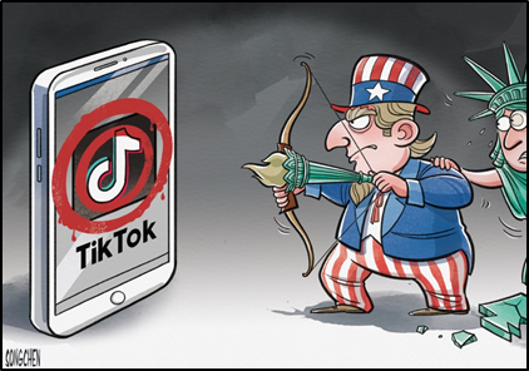
Multiple halo effects hover above the United States’ head (“free market” and “beacon of democracy,” among others), but in the case of the crackdown on TikTok, those halos have all but evaporated.
For one thing, the free market is a sham. Thanks to its advanced algorithms, TikTok has become one of the most popular social platforms in the world: About half of the U.S. population uses it — enough to rival other platforms like Facebook. But the fact that TikTok is so good, and that its parent company is Chinese, sends shivers down the spines of those American politicians who see themselves as the best in the world. TikTok has endured endless smears in both the Donald Trump and Joe Biden eras, and now the U.S. is even touting national security as an excuse to launch its “finishing moves,” formulating targeted bills in an effort to either oust TikTok or to forcibly dismember and appropriate it. “Fair competition,” as it’s called, is nothing but a joke.
For another, freedom of speech is a sham too. The First Amendment to the U.S. Constitution guarantees freedom of the press, and the U.S. often condescendingly criticizes other countries for controlling public discourse. In reality, though, this is a case of the pot calling the kettle black, as American public opinion is controlled by a small number of elites who decide what the common people should or should not see. Examples of this include the Palestinian-Israeli war, where the American media’s reporting has to be pro-Israel; or the Russia-Ukraine conflict, in which Russia is persistently demonized. But TikTok’s meteoric rise to prominence has given ordinary Americans more perspective and helped them understand the truth: TikTok has begun to pose a challenge to the American elite’s monopoly on information, and this is why they regard it as a thorn in their sides.
The beacon of democracy is a sham as well. Despite the crackdown it is experiencing, TikTok has not caved in, and a key reason for that is the consumer loyalty of American users. Many Americans are angry about the myriad ways in which the U.S. government and politicians are targeting TikTok — they believe that doing so deprives them of their right to know and of their civil rights, and they are calling or writing their lawmakers and demonstrating near the Capitol to make their position known. The TikTok incident has already become a referendum, yet the bill passed by the U.S. House of Representatives runs counter to the will of the American people. Can this still be called a democracy?
The incident is reminiscent of the folktale, “The Emperor’s New Clothes,” with the difference that, in the story, it’s just a child who bravely points out that the Emperor hasn’t got anything on! Now, though, the whole world is witness to the U.S. openly turning its back on core values, such as fair competition, freedom of speech, and democracy: striding along naked with the face of a despot.

Leave a Reply
You must be logged in to post a comment.